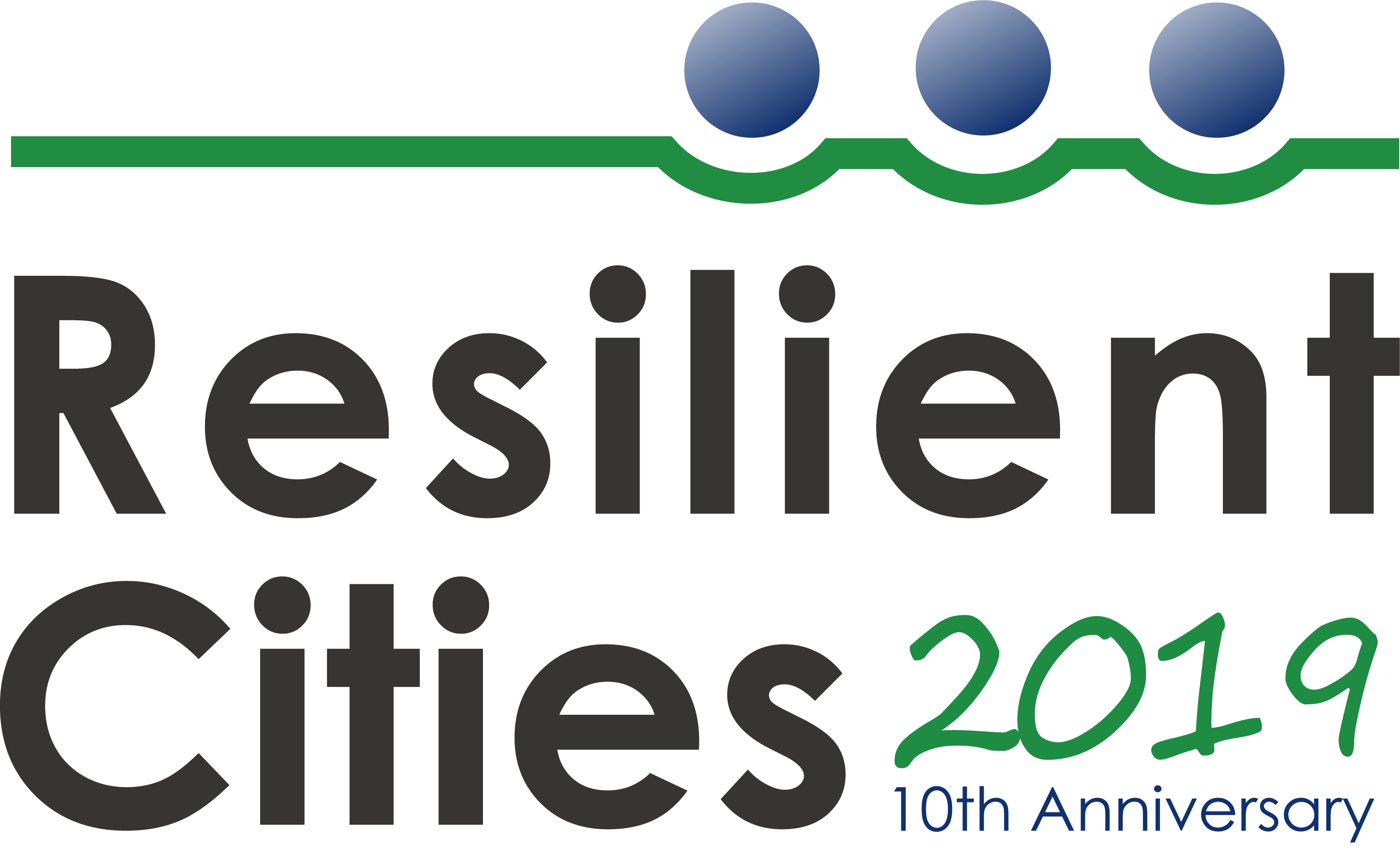Site Visits
Resilient Cities from the German perspective
The Resilient Cities 2019 Congress offers five exciting site visits presenting know-how and best practices in disaster risk management, Nature-based Solutions, and protection of cultural and natural heritage from the German perspective.
Participants who have selected one of the following site visits:
- 13:30-17:30: The Federal Office of Civil Protection and Disaster Assistance (BBK)
- 13:30-19:00: The City of Essen
are kindly requested to be at the registration desk at 13:15. The buses will depart from the GSI venue at 13:30.
Participants who have selected one of the following site visits:
- 15:00-18:00: Bonn Fire and Rescue Service
- 15:00-18:30: North route excursion (Beuel)
- 15:00-18:30: South route excursion (Mehlem)
are encouraged to attend the sessions taking place at the venue right before the site visits:
- E1 Plenary training: Accessing finance
- E2 Plant-Forward Food Systems
- E3 Methods to assess future vulnerability and risk to heat stress (ZURES)
Please be mindful that the buses will depart at 15:00 and you are kindly requested to be at the registration desk at 14:45.
Participants of all site visits will be transferred by buses directly to the evening reception venue, the Kunstmuseum.
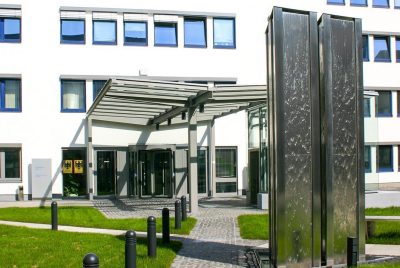
Thursday, 27 June 2019, 13.30 – 17.30
The Federal Office of Civil Protection and Disaster Assistance (BBK) looks forward to introducing some of its key tasks and topics during the ICLEI Resilient Cities 2019 Congress. After a presentation of the BBK and the German system of civil protection, delegates will visit four BBK divisions in turn. The key themes presented will be:
- Tasks of the German Joint Information and Situation Centre (GMLZ)
- Warning of the population
- Self-protection and self-help
- Structural civil protection
Organizer:
BBK is the German national agency to protect the population in a state of emergency or conflict against natural and man-made disasters including war. Its specific tasks include warning of the population in major incidents and managing resources and information in the case of a national disaster. BBK’s experts develop strategies, conduct crisis management exercises, and raise awareness among the general public to enhance self- protection.
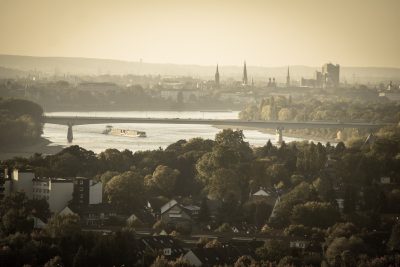
Thursday, 27 June 2019, 15.00 – 18.30
During its north route excursion, the German Committee for Disaster Reduction (DKKV) will present examples of adaptation measures taken by the City of Bonn and the population living in flood prone areas. Participants will have a walk through Bonn-Beuel. After the visit to the pump unit of the sewage plant, the visitors will walk to the newly established dykes. DKKV will then introduce the German civil protection system and highlight the importance of volunteer participation.
Requirements:
Both tours will take approximately three hours and require no specific equipment or fitness. As we intend to walk outside, you might want to refill your water bottles and bring an umbrella.
Organizer:
DKKV is a national platform for disaster prevention in Germany that features a consolidated network of key stakeholders within the disaster reduction domain at the national, European and international level. The network’s interdisciplinary and multi‐sectoral character enables a broad and targeted dissemination of initiatives, knowledge and methodologies within the disaster risk reduction community. As such, DKKV supported the development of international frameworks, as well as including members of governmental agencies, research institutes and organizations, humanitarian and development cooperation organizations and experts in disaster risk reduction.
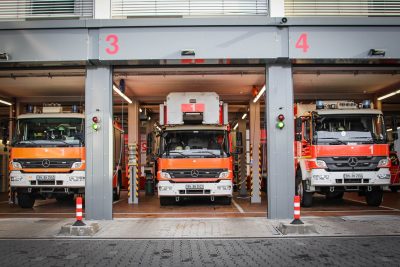
Thursday, 27 June 2019, 15.00 – 18.00
The Fire and Rescue Service of the Federal City of Bonn offers Resilient Cities participants a site visit to the main Fire and Rescue Station No.1. This fire station is one of five full time fire stations scattered across the whole city which are responsible for fire protection, technical response, rescue service and disaster management. The visitors will get an insight of the fire and rescue service, their tasks and resources and will experience their vehicles.
Organizer:
The Fire and Rescue Service of the Federal City of Bonn is responsible for safety of people and visitors of the City of Bonn. In addition to fire protection, technical response and the rescue service, the Fire Department of the City of Bonn is responsible for the safety on the river Rhine and disaster management. About 400 full-time employees are stationed on 5 fire and rescue stations scattered across the whole city. In addition, about 600 volunteer fire fighters provide their support at 18 volunteer fire stations. The Fire and Rescue Service is alerted to nearly 40.000 incidents a year to extinguish fires, help people or animals in an emergency and protect people and environment from hazardous substances.
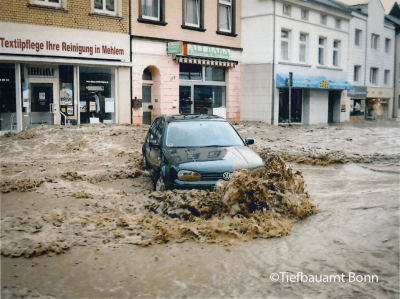
Thursday, 27 June 2019, 15.00 – 18.30
Participants in the south route excursion will visit the flood risk area Bonn-Mehlem. Here, technical infrastructure and an early warning system were installed to deal with flood hazards and protect inhabitants and infrastructures in case of flooding due to heavy precipitation events. DKKV will also present the historical development of the river Rhine, historical floods in Bonn and city-scale flood management. Droughts, low water, and the cascading effects and consequences will also be addressed.
Requirements:
Both tours will take approximately three hours and require no specific equipment or fitness. As we intend to walk outside, you might want to refill your water bottles and bring an umbrella.
Organizer:
DKKV is a national platform for disaster prevention in Germany that features a consolidated network of key stakeholders within the disaster reduction domain at the national, European and international level. The network’s interdisciplinary and multi‐sectoral character enables a broad and targeted dissemination of initiatives, knowledge and methodologies within the disaster risk reduction community. As such, DKKV supported the development of international frameworks, as well as including members of governmental agencies, research institutes and organizations, humanitarian and development cooperation organizations and experts in disaster risk reduction.
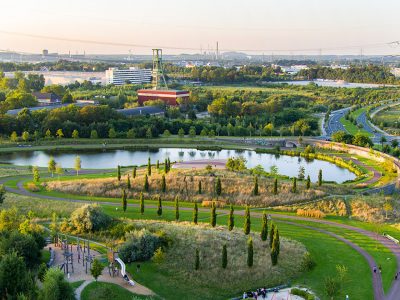
Thursday, 27 June 2019, 13.30 – 19.00
Being Green Capital of Europe 2017, the city of Essen became a blueprint for the transformation of a city in the heart of the Ruhr metropolis. The times of industrialization with expansive coal mining and steel production have given face and significance to this region, and the Ruhr area has thus become home to over 5 million people today. In a landscape, that 200 years ago was home to wild horses and farmers, these driving forces have created a metropolitan region, which is today the third biggest agglomeration of central Europe. The Zollverein colliery was once the most productive coal mine in the world and Krupp‘s steelworks are still a symbol of German steel processing industry today. But global changes in production and goods management have initiated another wave of change in the Ruhr region as well, and caused a crisis in the core industries of the region. See how industrial legacies have been transformed to green and blue infrastructures supporting biodiversity, sustainable water management and quality of life for the neighborhoods.
Organizer:
With 594.000 inhabitants, Essen is one of Germany’s largest cities. With the long transition process from an industrial history to a science and service-based economy, Essen experienced several important transition strategies. After transforming industrial legacy to places of culture and identity, Essen and the Ruhr metropolis managed to become a livable and green region. With the great visions of the International Building Exhibition “IBA Emscherpark”, Essen and the entire Region managed to become a European Capital of Culture in 2010 and the Green Capital of Europe Essen 2017.
The site visits are organized by our esteemed partners: The Federal Office of Civil Protection and Disaster Assistance; The German Committee for Disaster Reduction (DKKV); The Fire and Rescue Service of the Federal City of Bonn; and The City of Essen.
